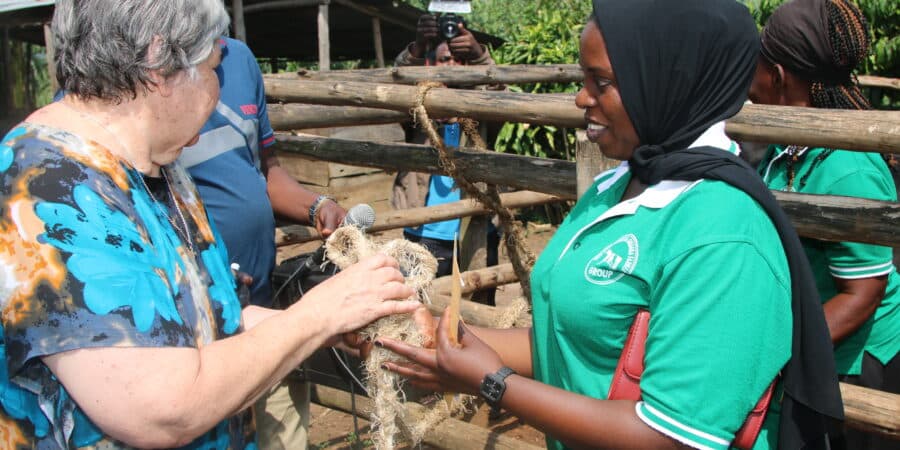Women in Africa face significant challenges, including poverty, which exacerbates their struggle for economic empowerment and gender equality. Poverty disproportionately affects women in Africa, who are often the primary caregivers for their families and face significant barriers to accessing education, healthcare, and financial resources. This not only limits their ability to escape poverty but also perpetuates the cycle of poverty for future generations.
We believe women have the right, will, and capacity to direct their own future and lift themselves out of extreme poverty with dignity and respect. To help display the ever-present power women in Africa have on changing their own future, we’ve recapped three encounters our Executive Director, Heather Cammarata, has had meeting women through our partner programs.
Margret
A woman farmer, Margret, was giving us a tour of her farm in Kyotera, near Masaka, Uganda, in 2014. Her voice was quiet, but her confidence spoke volumes. She showed us the zero-grazing shed she built for her cow, the dish drying station and tippy-tap handwashing station that she constructed and continued to use, the raised vegetable beds which now easily resisted the erosion caused by seasonal heavy rains, and many other improvements around the home. As we walked, this woman shared her story.
“Before the Cow Project, my neighbors had pity on me. I was a widow with children I struggled to feed, and could not afford the fees to keep them in school. I resorted to begging from my neighbors for food. But since joining the Cow Project, I have learned how to organize my farm to be more productive. And, now that I have a cow, the milk provides nutrition for my children. I sell the extra to the dairy for income. The cow’s waste is used to fertilize my crops, and my banana plants, coffee plants, and pineapples are thriving–in fact, I get the best prices when I sell them at the market. Now my children are in school, and my neighbors come to me for advice since I am now a successful businesswoman.”
She continued, “I think I am going to run for chief.”
Nancy
We were walking through Kibera Slum in Nairobi, Kenya in 2013 with Wilson Maina, Jane Ngouri, and Janet Bett, all members of Jamii Bora Trust and Yawezekana SACCO. We came to the fringes of the Toi Market, a bustling hive of kiosks managed by micro-entrepreneurs selling everything from handmade charcoal to pieces of wax print fabric to used shoes and second-hand clothing to bags of maize and dried beans.
Janet introduced us to Nancy, who was managing her produce stand by the side of Nagong Road. Nancy shared her story..
“I came to Nairobi 20 years ago, fleeing violence in my village. I hoped to find work, but was not familiar with the dialect and it was difficult. I ended up homeless and living in the alleys with my children, begging during the day. Some other mothers and I joined Jamii Bora and started saving little by little. I took a small loan to start an income project and quickly earned enough to save more and repay my loan. I borrow two times what I have in savings, buy more produce, sell it for a profit, add to my savings, and repay my loan. My circle of friends help me, and I help them. When the Toi Market was leveled in the post election violence in 2007, I lost everything. But I knew I could rebuild, because I’d done it before. I started over.
Nancy looked around, “Now my market is so big, I employ five people and even a security guard!”
Consolatha
Consolatha Emmanual is a widow who is raising her grandchildren. We visited her in Bukoba, Tanzania in 2013 and she showed us her farm and invited us to sit on the reeds covering the dirt floor of her home as she shared her story.
“Before joining the Bukoba Women’s Empowerment Association (BUWEA), I struggled to survive and even to provide shelter for my family. My husband had died, and children looked to me to provide for them. My home had no roof, and the walls were crumbling. We were starving.
Through BUWEA, I took loans to operate a local cow business, raising the cows and selling them at market. I cut down hardwoods on my land and saw the logs into boards for sale for construction materials. I am now proud to report that my grandchildren are thriving in school, and I have expanded my house and put on a new tin roof. I meet with other women often to show them how to manage a loan and an income project and how to help each other. I am now encouraging 40 groups of women who are all participating in the revolving loan program.”
Margret, Nancy, and Consolatha demonstrate the profound capacity that resides in women. When given the chance, a hand up, they not only took steps to provide for their families and stuck with it, they not only achieved success in managing their income projects, they not only built their resilience and their savings, they reached out to those around them to extend a hand up to others. Margret, Nancy, and Consolatha are bringing their communities up with them as they rise.
How can we not be inspired?

